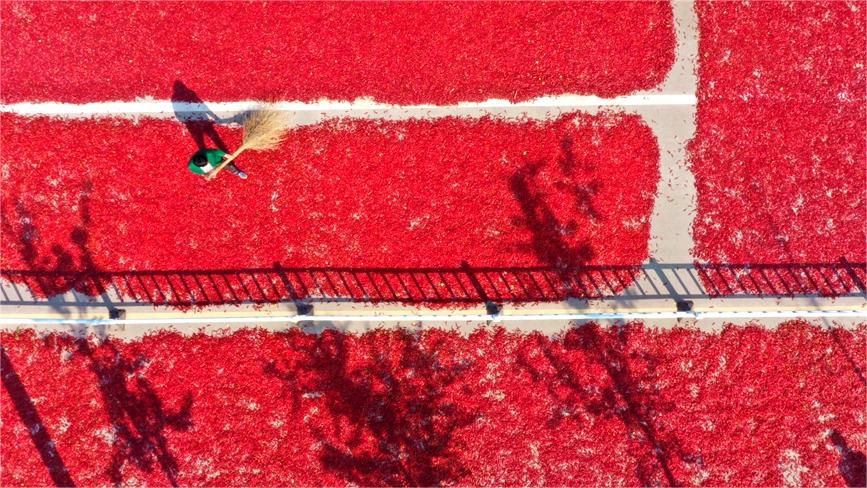Upholding legacy of Flying Tigers, renewing China-U.S. people-to-people friendship
An event to commemorate the 80th anniversary of the U.S. 14th Air Force's participation in China's war of resistance against Japanese aggression was held at the Museum of the War of Chinese People's Resistance against Japanese Aggression on Oct. 30.
The event was hosted by the Chinese People's Association for Friendship with Foreign Countries. Nearly 100 attendees from China and the U.S. gathered for the commemoration, including a delegation of Flying Tigers veterans and their descendants brought together by the Sino-American Aviation Heritage Foundation and the Flying Tiger Historical Organization, as well as government officials from California.

The delegation of the Sino-American Aviation Heritage Foundation attends a Flying Tigers historical photo exhibition in Beijing. Flying Tigers veterans and their families, including 103-year-old Harry Moyer and 98-year-old Melvin McMullen, paid respect to General Chennault and soldiers from both China and the U.S. during WWII, who fought against Japanese aggression shoulder by shoulder. (People's Daily/Zhang Penghui)
During the event, the U.S. delegation visited a photo exhibition commemorating the 80th anniversary of the U.S. 14th Air Force's participation in China's war of resistance against Japanese aggression, an exhibition on the participation of the American Volunteer Group (AVG) in China's war of resistance against Japanese aggression, an exhibition on Chinese military and civilian rescuing American pilots, as well as other permanent exhibitions.
The delegation laid wreaths in front of the statues of the heroes who fought against Japanese aggression. Flying Tigers veterans Harry Moyer and Melvin McMullen paid tribute to the statue of U.S. General Claire Lee Chennault and old photos of Flying Tigers pilots. It happened to be Moyer's 103rd birthday that day, and the attendees sent their blessings to him.
In 1941, a large group of American young pilots, led by Chennault, established the AVG, also known as the Flying Tigers. They came to China and fought side by side with the Chinese people to resist Japanese fascist aggression. In 1943, the Flying Tigers were incorporated into the U.S. 14th Air Force. During the war, over 2,000 Flying Tigers airmen gave their precious lives. Over the past 80 years, the bond forged between the Flying Tigers and the Chinese people in the flames of war has been passed down from generation to generation, remaining evergreen.
In Chongqing municipality, Kunming of Yunnan province, Guilin of Guangxi Zhuang autonomous region, as well as other places where the Flying Tigers fought, many memorials and museums have been built to tell the touching stories of the solidarity and shared hardships between the Flying Tigers and the Chinese People.
Flying Tigers and their descendants have paid multiple visits to China, and invited Chinese civilians who once helped American soldiers to visit the U.S., commemorating the profound friendship forged during the times when both nations supported each other.
McMullen, 98, once fought against Japanese aggression in Kunming and Chengdu, Sichuan province. He fondly recalled his friendly bond with the Chinese people in the past, saying when their planes were pursued and attacked by Japanese forces, their first thought was to find the nearest Chinese village to make an emergency landing.
He said he had more than once personally witnessed and heard the stories of Chinese people risking their lives to help and rescue Flying Tigers members, and through fighting side by side, the two sides forged a profound friendship.
According to him, the Flying Tigers veterans have always cherished this friendship, and he wants to share this history to help more people understand the spiritual wealth that transcends time and space between the two nations.
The visit led by the Sino-American Aviation Heritage Foundation to China was not only a journey to revisit history but also a means to encourage the younger generation of both countries to learn the story of the Flying Tigers and carry forward their spirit, with an aim to ensure that the friendly relations between the two nations are passed down from generation to generation, said Jeffrey Greene, Chairman of the Sino-American Aviation Heritage Foundation.

The delegation of the Sino-American Aviation Heritage Foundation attends a Flying Tigers historical photo exhibition in Beijing. Flying Tigers veterans and their families, including 103-year-old Harry Moyer and 98-year-old Melvin McMullen, paid respect to General Chennault and soldiers from both China and the U.S. during WWII, who fought against Japanese aggression shoulder by shoulder. (People's Daily/Zhang Penghui)
Over a month ago, Chinese President Xi Jinping replied to a letter from Greene, Moyer and McMullen, which greatly inspired them.
Communication and exchange between Chinese and Americans, especially the younger generation, are crucial, Greene noted. The members of this delegation visiting China included not only veterans of the Flying Tigers but also young individuals, who will continue to share stories of the friendly exchanges between the two nations when they return to the U.S.
Jackson Long, 15, was the youngest member on the visiting delegation. He is the great-grandson of the Flying Tigers veteran Clifford Long. The boy is currently attending high school in Pennsylvania.
It was his first time visiting China. He said he used to hear the stories about the Flying Tigers from his elders, but lacked a concrete understanding of what China is really like. Over the past few days, from Shanghai to Beijing, he saw China's development and felt the enthusiasm and friendliness of the Chinese people. "I will do my best to help those around me understand China better," he noted.
The Flying Tigers spirit serves as a bond connecting the U.S. and China, reminding the two peoples not to forget the deep friendship forged during the war and to create a bright future of cooperation and mutual benefit, said Nell Calloway, General Chennault's granddaughter and the CEO of the Chennault Aviation and Military Museum. She has been dedicated to promoting U.S.-China people-to-people exchanges over the years.
She told People's Daily that the U.S.-China relationship is the most important bilateral relationship in the world today. Despite the current disagreements and differences between the two countries, the aspirations for peace and a better life are shared by both peoples.
"President Xi Jinping hopes that the spirit of the Flying Tigers can be passed down from generation to generation between the two peoples, and this is also our hope. We hope that both countries can set aside their differences and work together to create a better future for the two peoples," she said.
As two major countries, it is our important responsibility to join hands in tackling challenges, said Yang Wanming, president of the Chinese People's Association for Friendship with Foreign Countries. The enduring friendship between the two peoples will infuse continuous momentum into the development of China-U.S. relations, and bring new hope for world peace, stability, and progress, Yang added.
Erik Lutz, Mayor of Pico Rivera, California, told People's Daily that the friendship between the Flying Tigers and the Chinese people is something to be cherished. As a mayor in California, he looks forward to engaging in practical cooperation with China, creating opportunities for growth, continuously developing the friendship between the two nations, and enriching the connotation of their bilateral relationship.
Photos
Related Stories
- To promote stable, positive development of China-U.S. relations
- Campbell’s new nomination signifies US continued focus on China containment
- Huge blobs in Earth's mantle might be relics from moon-forming collision: study
- 19th Chinese American film, TV festivals kick off in LA
- Win-win arrangement being turned into loss
Copyright © 2023 People's Daily Online. All Rights Reserved.









